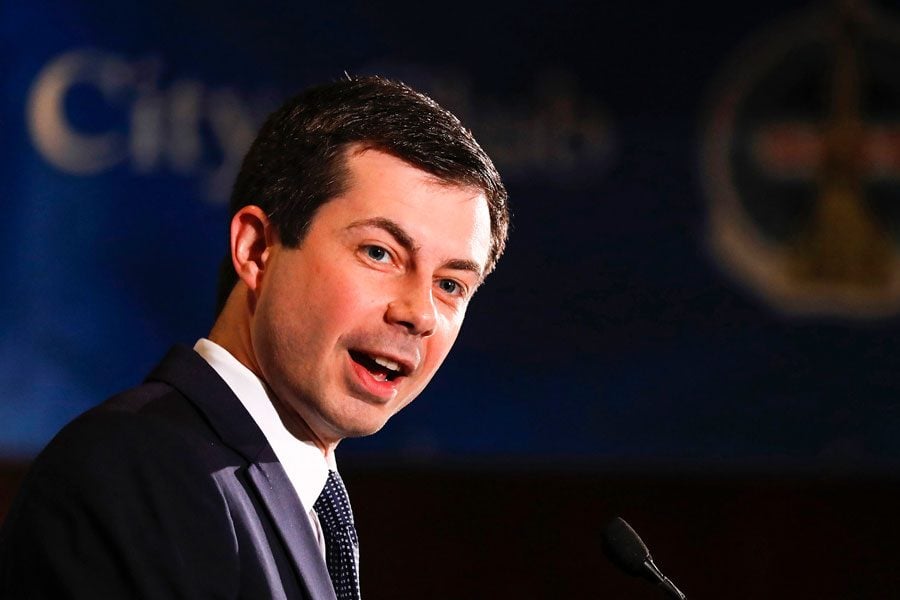Presidential candidate Pete Buttigieg speaks at UChicago Institute of Politics
Jose M. Osorio/Chicago Tribune/TNS
Presidential candidate and South Bend, Ind., Mayor Pete Buttigieg speaks at the City Club of Chicago luncheon in Chicago on May 16, 2019.
October 20, 2019
CHICAGO — On the heels of his pundit-determined “win” of the fourth Democratic presidential debate, Pete Buttigieg, mayor of South Bend, Indiana, spoke to a packed audience at the University of Chicago Institute of Politics on Friday.
Interviewed by David Axelrod — senior aide to former President Barack Obama and Director of the Institute of Politics — Buttigeig discussed the rise of his candidacy, holding competitor Sen. Elizabeth Warren (D-Mass.) accountable for the lack of transparency on how to finance her medicare-for-all promises and how he hopes to fix America’s broken democratic structures.
The candidate delved into the idea of ensuring a national popular vote, noting that it was why he is running for president. Buttigieg added he plans to tackle issues of gerrymandering, the role of money in politics and possibly eliminating the electoral college.
“It’s never sexy, the process stuff is not sexy,” Buttigeig said. “But that’s got to be done right alongside dealing with climate and wages and racial inequity and health care if we want to advance as a country in our lifetime.”
Refocusing on Warren, Buttigieg highlighted their differing policies on the financing of higher education.
The mayor said he believes it’s important to consider “who is paying for what for whom,” opposing the policies of more progressive candidates in which the government provides “free college” for everyone. Instead, he advocates for a model in which only lower and middle income students would be relieved of the cost burden, one that wouldn’t apply to wealthy Americans.
Axelrod then quipped that the individuals that Buttigieg calls “very rich,” the University of Chicago calls “trustees.”
“Those trustees’ children, should they go to college, I think they can pay their own tuition,” Buttigieg replied. “I don’t think we need to make it free for absolutely everybody. I think we should make it free for anyone who would face this as a barrier.”
The mayor spoke to a diverse audience, paralleling the demographics of the Hyde Park neighborhood in which the university’s campus is located. This came in direct contrast to a September grassroots event Buttigieg held in the Bronzeville neighborhood — as Axelrod pointed out during the conversation, the audience there was overwhelmingly white despite the area’s predominantly black population.
While his comments on resolving the damage created by Trump’s presidency and how the mayor’s promises are more sound than his fellow candidates elicited nods of approval from the crowd, Buttigieg received critical notes from both Axelrod and students on his relationship with black Americans.
One point of contention was built off the news that the Buttigieg campaign would return thousands of dollars in contributions by former City Hall attorney Steve Patton, who fought against the public release of footage showing then-officer Jason Van Dyke’s fatal shooting of Laquan McDonald.
Axelrod brought up the announcement just before turning to the audience for questions, noting that this was a “growing pains” story and the campaign should have created the infrastructure to evaluate donors more thoroughly, especially considering his support amongst African American voters in certain primary states is “negligible.”
“That’s not an unfair way to put it,” said Buttigeig, adding that his campaign had increased from around four to 400 staffers over the past 10 months.
“I’d hire one more and put them on vetting,” Axelrod responded.
The first audience question came from black graduate student, who asked what Buttigieg would do to close the racial wealth gap as president.
Buttigieg answered that he supported H.R. 40, a congressional bill to study and commision a proposal for retributions to African Americans. He also mentioned his proposals for criminal justice and access to credit reform, noting that because the “disparity is systemic, the solution has to be systemic too.”
“There is a conversation that needs to happen among white Americans — this can’t be something that is only raised as a sort of specialty topic for black audiences,” Buttigieg said. “And frankly, it’s important to not only hear about this from candidates of color, because there’s got to be a way without arousing some of the defensiveness that a lot of people have to talk about how everyone is implicated in this problem and how everyone can be a part of a reparative or restorative process to make it better in our lifetime.”
Email: [email protected]
Twitter: @daisy_conant


